
Finland, officially the Republic of Finland, is a Nordic country and a member state of the European Union in Northern Europe. It shares land borders with Sweden to the west, Russia to the east, Norway to the north, and is defined by the Gulf of Bothnia to the west, and the Gulf of Finland of the Baltic Sea across Estonia to the south. Finland covers an area of 338,455 square kilometres (130,678 sq mi) with a population of 5.5 million. Helsinki is the country's capital and largest city, and forms a larger metropolitan area together with the neighbouring cities of Espoo, Kauniainen, and Vantaa. Finland is officially bilingual, with Finnish and Swedish being official. The climate varies relative to latitude, from the southern humid continental climate to the northern boreal climate. The land cover is primarily a boreal forest biome, with more than 180,000 recorded lakes.
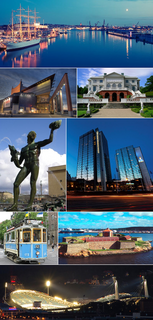
Gothenburg is the second-largest city in Sweden, fifth-largest in the Nordic countries, and capital of the Västra Götaland County. It is situated by Kattegat, on the west coast of Sweden, and has a population of approximately 570,000 in the city proper and about 1 million inhabitants in the metropolitan area.

Swedish is a North Germanic language spoken natively by at least 10 million people, predominantly in Sweden and in parts of Finland, where it has equal legal standing with Finnish. It is largely mutually intelligible with Norwegian and Danish, although the degree of mutual intelligibility is largely dependent on the dialect and accent of the speaker. Written Norwegian and Danish are usually more easily understood by Swedish speakers than the spoken languages, due to the differences in tone, accent, and intonation. Swedish is a descendant of Old Norse, the common language of the Germanic peoples living in Scandinavia during the Viking Era. It has more speakers than any other North Germanic language.
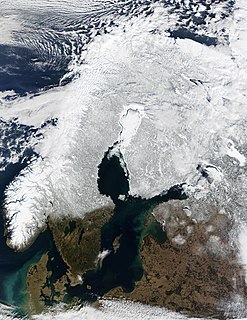
Scandinavia is a subregion in Northern Europe, with strong historical, cultural, and linguistic ties.

Stockholm is the capital and largest city of Sweden as well as the largest urban area in Scandinavia. Approximately 980,000 people live in the municipality, with 1.6 million in the urban area, and 2.4 million in the metropolitan area. The city stretches across fourteen islands where Lake Mälaren flows into the Baltic Sea. Outside the city to the east, and along the coast, is the island chain of the Stockholm archipelago. The area has been settled since the Stone Age, in the 6th millennium BC, and was founded as a city in 1252 by Swedish statesman Birger Jarl. It is also the county seat of Stockholm County.
The Swedish Armed Forces is the government agency that forms the armed forces of Sweden, tasked with the defense of the country as well as with promoting Sweden's wider interests, supporting international peacekeeping, and providing humanitarian aid. It consists of the Swedish Army, the Swedish Air Force and the Swedish Navy, as well as a military reserve force, the Home Guard. Since 1994, all Swedish military branches are organized within a single unified government agency, headed by the Supreme Commander, even though the individual services maintain their distinct identities.

Uppsala is the county seat of Uppsala County and the fourth-largest city in Sweden, after Stockholm, Gothenburg, and Malmö. It had 177,074 inhabitants in 2019.

The Great Northern War (1700–1721) was a conflict in which a coalition led by the Tsardom of Russia successfully contested the supremacy of the Swedish Empire in Northern, Central and Eastern Europe. The initial leaders of the anti-Swedish alliance were Peter I of Russia, Frederick IV of Denmark–Norway and Augustus II the Strong of Saxony–Poland–Lithuania. Frederick IV and Augustus II were defeated by Sweden, under Charles XII, and forced out of the alliance in 1700 and 1706 respectively, but rejoined it in 1709 after the defeat of Charles XII at the Battle of Poltava. George I of Great Britain and the Electorate of Hanover joined the coalition in 1714 for Hanover and in 1717 for Britain, and Frederick William I of Brandenburg-Prussia joined it in 1715.

Carl XVI Gustaf is King of Sweden. He ascended the throne on the death of his grandfather, Gustaf VI Adolf, on 15 September 1973.
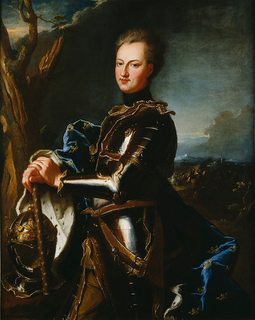
Charles XII, sometimes Carl XII or Carolus Rex, was King of Sweden from 1697 to 1718. He belonged to the House of Palatinate-Zweibrücken, a branch line of the House of Wittelsbach. Charles was the only surviving son of Charles XI and Ulrika Eleonora the Elder. He assumed power, after a seven-month caretaker government, at the age of fifteen.

The Swedish Air Force is the air force branch of the Swedish Armed Forces.

The Sweden national football team represents Sweden in men's international football and it is controlled by the Swedish Football Association, the governing body of football in Sweden. Sweden's home ground is Friends Arena in Solna and the team is coached by Janne Andersson. From 1945 to late 1950s, they were considered one of the greatest teams in Europe.

Zlatan Ibrahimović is a Swedish professional footballer who plays as a striker for Serie A club AC Milan and the Sweden national team. He is widely regarded as one of the greatest strikers of all time. Ibrahimović is one of the most decorated active footballers in the world, having won 31 trophies in his career. He has scored over 570 career goals, including more than 500 club goals, and has scored in each of the last four decades.

The Pirate Bay is an online index of digital content of entertainment media and software. Founded in 2003 by Swedish think tank Piratbyrån, The Pirate Bay allows visitors to search, download, and contribute magnet links and torrent files, which facilitate peer-to-peer (P2P) file sharing among users of the BitTorrent protocol.

Sweden, officially the Kingdom of Sweden, is a Nordic country in Northern Europe. It borders Norway to the west and north, Finland to the east, and is connected to Denmark in the southwest by a bridge-tunnel across the Öresund. At 450,295 square kilometres (173,860 sq mi), Sweden is the largest country in Northern Europe, the third-largest country in the European Union, and the fifth largest country in Europe. The capital and largest city is Stockholm. Sweden has a total population of 10.4 million, the largest of the Nordic countries; and a low population density of 25.5 inhabitants per square kilometre (66/sq mi). 87% of Swedes live in urban areas, which cover 1.5% of the entire land area. The highest concentration is in the central and southern half of the country.
Sverigetopplistan is the Swedish national record chart, earlier known as Topplistan (1975–1997) and Hitlistan (1998–2007) and known by its current name since October 2007, based on sales data from the Swedish Recording Industry Association. Before Topplistan, music sales in Sweden were recorded by Kvällstoppen, whose weekly chart was a combined albums and singles list.

The Swedish Empire was a European great power that exercised territorial control over much of the Baltic region during the 17th and early 18th centuries. The beginning of the empire is usually taken as the reign of Gustavus Adolphus, who ascended the throne in 1611, and its end as the loss of territories in 1721 following the Great Northern War.
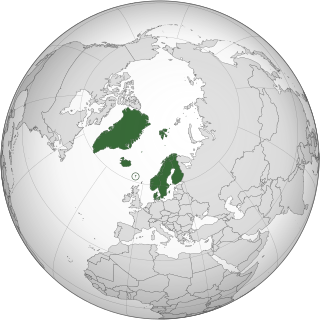
The Nordic countries are a geographical and cultural region in Northern Europe and the North Atlantic. It includes the sovereign states of Denmark, Finland, Iceland, Norway and Sweden as well as the autonomous territories of the Faroe Islands and Greenland, and the autonomous region of Åland.
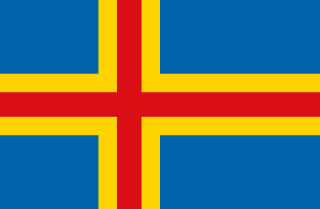
Åland is an autonomous and demilitarised region of Finland since 1920 by a decision of the League of Nations. It is the smallest region of Finland by area and population, with a size of 1,580 km2, and a population of 30,129, constituting 0.51% of its land area and 0.54% of its population. Its only official language is Swedish and Mariehamn is the capital city.
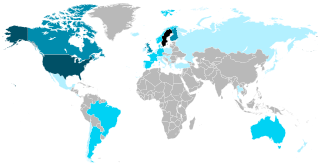
Swedes are a North Germanic ethnic group native to the Nordic region, primarily their nation state of Sweden, who share a common ancestry, culture, history and language. They mostly inhabit Sweden and the other Nordic countries, in particular Finland, with a substantial diaspora in other countries, especially the United States. Swedes are an officially recognized minority in Finland and Estonia.